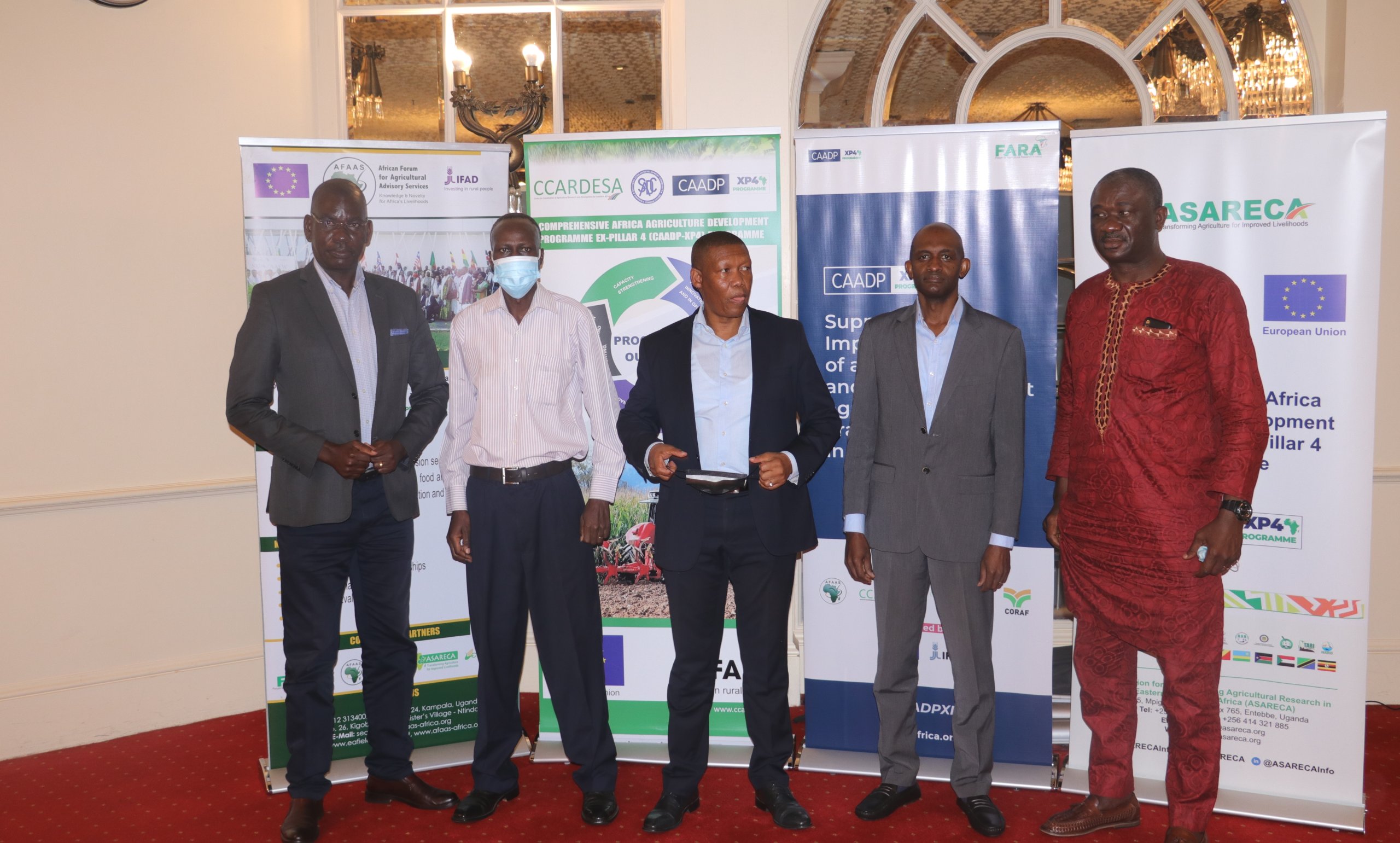ASARECA takes over leadership of CAADP-XP4 Programme

TC members: Moses Odeke, ASARECA; Max Olupot, AFAAS; Baitsi Podisi, CCARDESSA; Aggrey Agumya, FARA; Emmanuel OKel Njukwe, CORAF
Effectively, ASARECA Executive Director, Dr. Enock Warinda was announced the new Chairman of the CAADP-XP4 Advisory Committee, putting him at the helm of the Programme structure
By Ben Moses Ilakut
NAIROBI, KENYA: The Association for Strengthening Agricultural Research in Eastern and Central Africa (ASARECA) has assumed the leadership of the Comprehensive Africa Agriculture Development Programme (CAADP ex-pillar IV) Programme in line with a rotational arrangement agreed upon by the consortium partners.
According to the arrangement, a consortium institution chairs the Advisory Committee and the Technical Committee for a period of one year and hands over to the co-chair institution in the subsequent year. ASARECA has been co-chair to the African Forum for Agricultural Advisory Services (AFAAS).
Effectively, ASARECA Executive Director, Dr. Enock Warinda was announced the new Chairman of the CAADP-XP4 Advisory Committee, putting him at the helm of the Programme structure.
Similarly, Mr. Moses Odeke, ASARECA’s Technical Officer, Monitoring and Evaluation, was elected as the new Chairperson of the Technical Committee. In the spirit of rotation and succession, ASARECA team will be supported by colleagues from CORAF in the co-leadership positions, as they are groomed to take over leadership in the next round of rotation.
The Advisory Committee (TC) (front) and the Technical Committee of CAADP-XP4 Programme
The CAADP-XP4 Programme is funded by the European Union under the initiative “Development Smart Innovation through Research in Agriculture” (DeSIRA) to the tune of EUR 30 million over a four-year period (2019- 2023). Each of five institutions has been allocated an equal share of the kitty to implement capacity strengthening initiatives in their sub-regions and member countries.
Deploying science for sustainable transformation
DeSIRA is aimed at deploying science and innovation to achieve inclusive, sustainable and climate relevant transformation of agriculture and related food systems in partner countries across the globe. The fund is managed by IFAD.
A unique governance structure
The CAADP-XP4 Programme implements a uniquely elaborate working arrangement resourced by thematic working groups (TWGs) that include: M&E; Communication and Knowledge management; Partnerships and Resource Mobilization; Capacity Development; Policy and Gender. These working groups are constituted by subject matter specialists from the consortium as hubs for cross fertilization of ideas among the experts from partner institutions for the benefit of the Programme. The TWG is guided by senior research colleagues in the Technical Committee who convene meetings to discuss and consolidate achievements, and harness lessons learnt into opportunities. The Technical Committee is led by Mr. Moses Odeke, ASARECA (chair); Emmanuel Njukwe, CORAF (co-chair); Max Olupot, AFAAS (outgoing chair); Baitsi Podisi, CCARDESSA; and Aggrey Agumya, FARA. They report to the Advisory Committee (AC), which is at the apex.
Executive Directors speak
In an acceptance speech, ASARECA Executive Director, Dr. Enock Warinda, advised the consortium members to be clear on what the institutions intend to do to fast track issues to do with foresight, support to member countries to prepare for the coming CoP 27, and to optimise the benefits of knowledge management by digitizing resources to capture both tacit and explicit knowledge at the risk of being lost.
AFAAS Executive Director, Dr, Silim Nahdy noted that the CAADP-XP4 Programme has turned out to be a proof of concept as an effective model for delivery of agricultural transformation.
Dr. Cliff Dlamini, the Executive Director, CCARDESSA, said country level collaboration should be emphasized by the consortium, through mainstreaming the role of Governments.
CORAF Executive Director, Dr. Abdou Tankouano, upheld the advice by Development partners (IFAD) for CAAAD-XP4 partners to use the excellent Programme experience to recreate their value propositions into the future. This was re-echoed by FARA Executive Director, Dr. Yemi Akinbamijo, who noted that the refreshed value propositions would breathe new blood into resource mobilization efforts.
